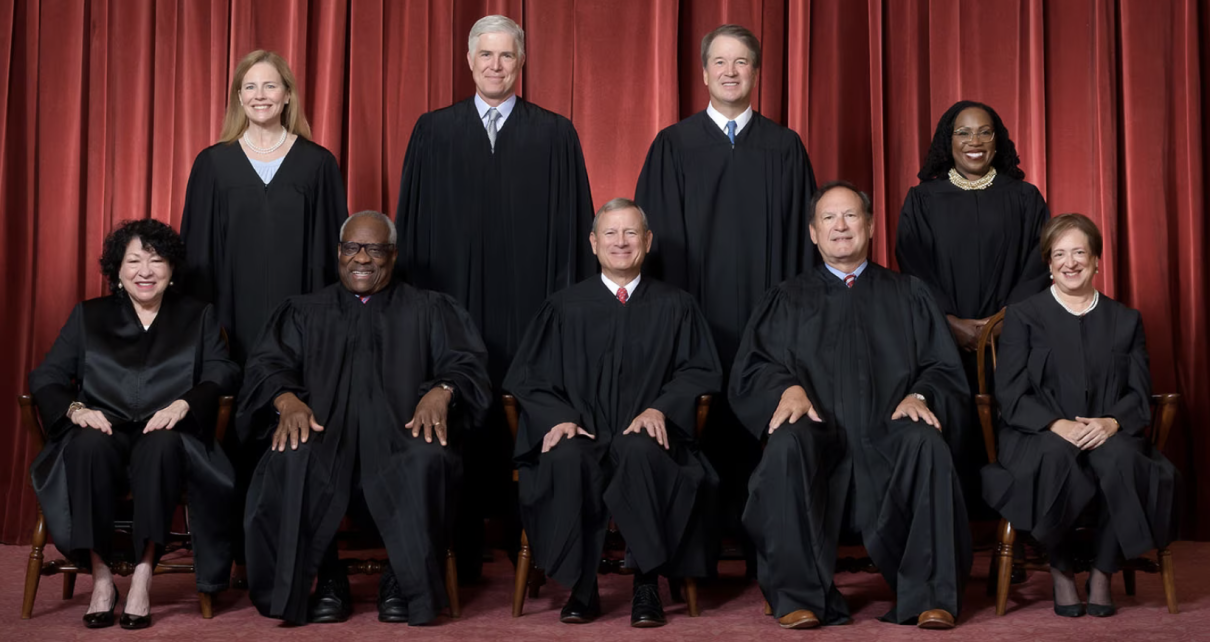
Justices of The U.S. Supreme Court. (Photo: supreme court.gov)
Supreme Court Outlaws Affirmative Action in College Admissions, Bolsters CA’s Prop. 209
How can any judge on the Supreme Court not believe in merit?
By Katy Grimes, June 29, 2023 8:22 am
The United States Supreme Court issued a ruling on Wednesday against using affirmative action in the college admissions process. California passed its own Civil Rights Initiative, Proposition 209, in 1996, passed by voters 55% to 45%, which said that the state cannot discriminate against or grant preferential treatment on the basis of race, sex, color, ethnicity, or national origin in the operation of public employment, public education, and public contracting.
Prop. 209 is based on the exact language of the 1964 U.S. Civil Right Act.
Proposition 16, on the 2020 November ballot, attempted to repeal Prop. 209 and divide Californians by making discrimination legal in California. However, voters spoke loudly and Prop. 16 failed at the ballot box
Today’s decision in the Supreme Court only bolsters California’s Civil Rights Initiative.
The Supreme Court struck down affirmative action programs at Harvard University and the University of North Carolina Thursday, ruling that their affirmative action programs were in violation of the Fourteenth Amendment.
The case: STUDENTS FOR FAIR ADMISSIONS, INC. v. PRESIDENT AND FELLOWS OF HARVARD COLLEGE:
“Both Harvard and UNC employ a highly selective ad- missions process to make their decisions. Admission to each school can depend on a student’s grades, recommendation letters, or extracurric- ular involvement. It can also depend on their race. The question presented is whether the admissions systems used by Harvard College and UNC are lawful under the Equal Protection Clause of the Four- teenth Amendment.”
Chief Justice John Roberts delivered the single majority opinion for both affirmative action cases.
“Eliminating racial discrimination means eliminating all of it,” Roberts wrote in the majority opinion. “And the Equal Protection Clause, we have accordingly held, applies ‘without regard to any differences of race, of color, or of nationality’—it is ‘universal in [its] application.’”
Roberts was joined in his opinion by all five of his colleagues on the court’s conservative wing: Justice Samuel Alito, Justice Clarence Thomas, Justice Amy Coney Barrett, Justice Brett Kavanaugh, and Justice Neil Gorsuch.
“Many universities … have concluded, wrongly, that the touchstone of an individual’s identity is not challenges bested, skills built, or lessons learned but the color of their skin. Our constitutional history does not tolerate that
choice,” Roberts wrote.
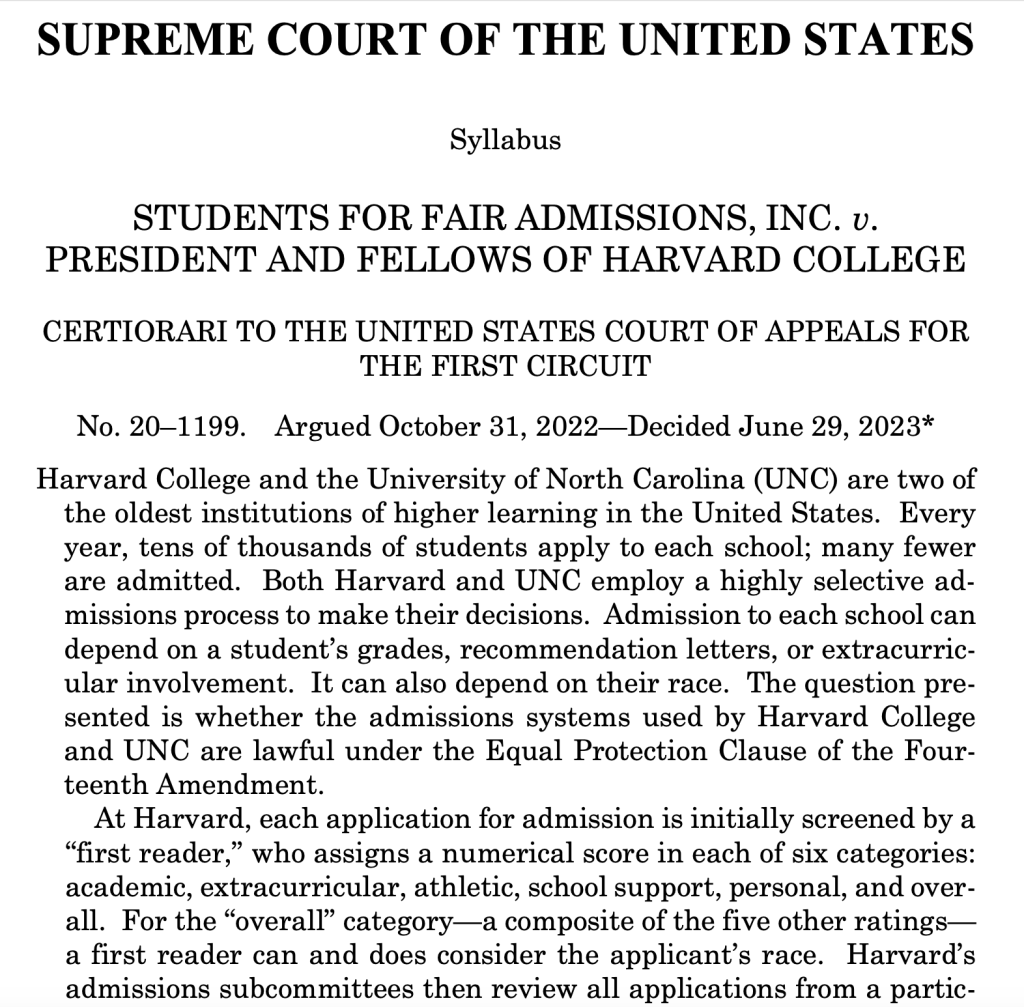
The court’s three liberals, Sonia Sotomayor, Elena Kagan and Ketanji Brown Jackson dissented, with Sotomayor writing the dissenting decision, and Brown Jackson recusing herself having attended Harvard:
“This limited use of race has helped equalize edu- cational opportunities for all students of every race and background and has improved racial diversity on college campuses.”
“Today, this Court stands in the way and rolls back dec- ades of precedent and momentous progress. It holds that race can no longer be used in a limited way in college ad- missions to achieve such critical benefits. In so holding, the Court cements a superficial rule of colorblindness as a con- stitutional principle in an endemically segregated society where race has always mattered and continues to matter. The Court subverts the constitutional guarantee of equal protection by further entrenching racial inequality in edu- cation, the very foundation of our democratic government and pluralistic society. Because the Court’s opinion is not grounded in law or fact and contravenes the vision of equality embodied in the Fourteenth Amendment, I dissent.”
How can any judge on the Supreme Court not believe in merit?
The United States has a color blind Constitution. This decision says “treat every individual as an individual.”
Predictably, the left is losing its collective mind.
Kristin McGuire, Executive Director of Young Invincibles, said:
“Today, the highest court in the country decided to roll back decades of progress towards equity and diversity on campuses. Race-conscious admissions are among the most powerful and effective policy responses to centuries of racial inequities in higher education. It is exactly that power that the six Justices seek to suppress with their decision.
Our education system simply does not provide all students with the same opportunities.”
Nowhere in the U.S. Constitution can you find “equity and diversity” or equality of opportunity. The United States does provide opportunity to people from all walks of life. Ms. McGuire is mincing words. Merit is what the left doesn’t understand.
What about the Asian and white students who met all of the rigid qualifications of Harvard, but were pushed out because of affirmative action by students who did not meet the qualifications?
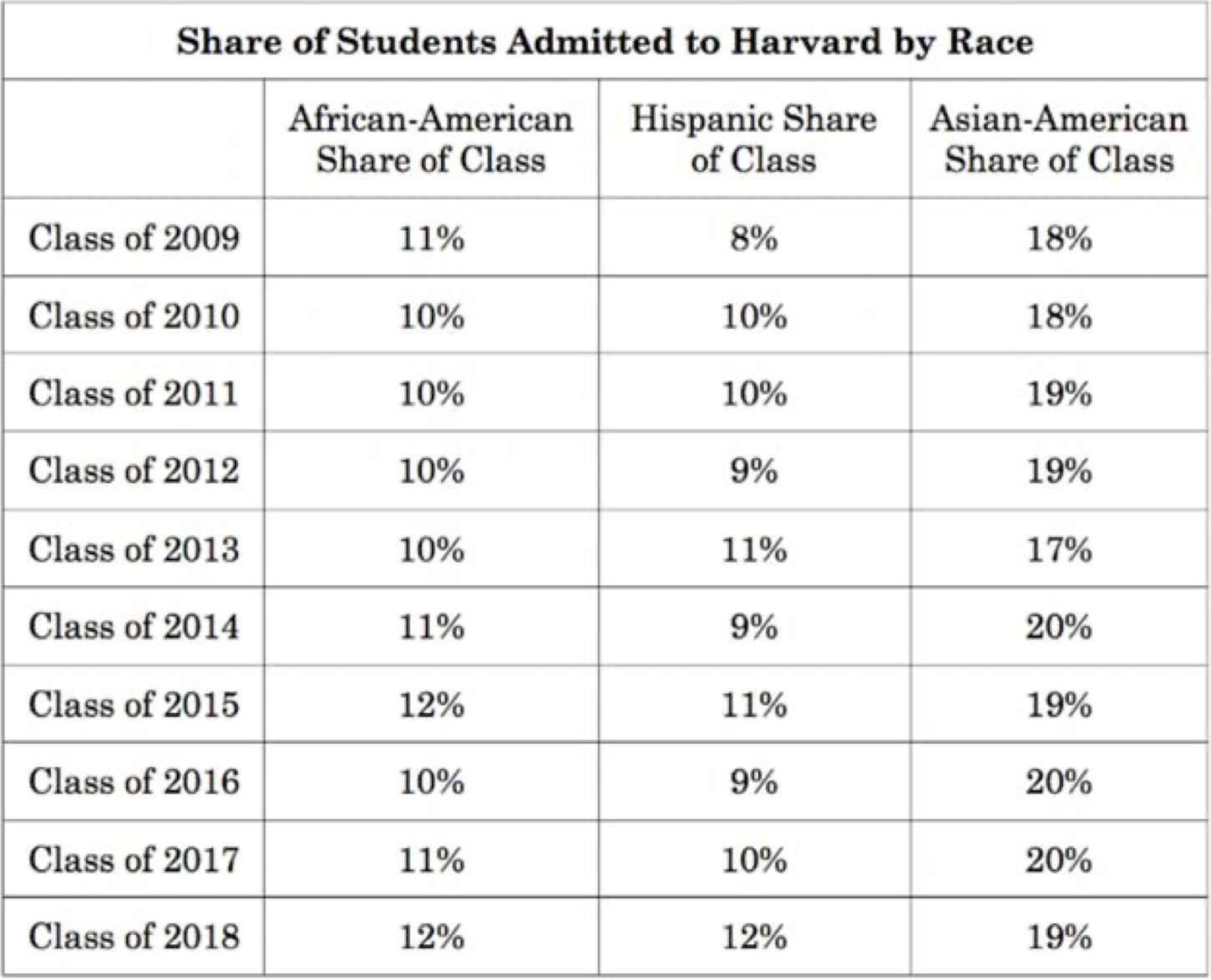
McGuire claims “Today’s decision is a devastating blow to students of color and the higher education community, but we won’t stop working to make a college degree in reach for all who seek it.”
A college degree is in reach for all who seek it, but not necessarily at Harvard or University of North Carolina. Millions of students graduating high school attend Community Colleges for one to two years, as well as state colleges and universities. Notably, the students pushed out of consideration because of affirmative action by students who did not meet the qualifications attend state colleges and universities, and/or avail themselves of scholarship opportunities.
Some highlights from the Robert’s decision:
“Distinctions between citizens solely because of their ancestry are by their very nature odious to a free people whose institutions are founded upon the doctrine of equality.” Rice v. Cayetano, 528 U. S. 495, 517 (2000) (quot- ing Hirabayashi v. United States, 320 U. S. 81, 100 (1943)). That principle cannot be overridden except in the most extraordinary case.”
“Our Court first considered that issue in Regents of University of California v. Bakke, which involved a set-aside admissions program used by the University of California, Davis, medical school. 438 U. S., at 272–276. Each year, the school held 16 of its 100 seats open for members of certain minority groups, who were reviewed on a special admissions track separate from those in the main admissions pool.”
“The plaintiff, Allan Bakke, was denied admission two years in a row, despite the admission of minority appli- cants with lower grade point averages and MCAT scores. Id., at 276–277. Bakke subsequently sued the school, argu- ing that its set-aside program violated the Equal Protection Clause.”
“Justice Powell began by finding three of the school’s four justifications for its policy not sufficiently compelling. The school’s first justification of “reducing the historic deficit of traditionally disfavored minorities in medical schools,” he wrote, was akin to “[p]referring members of any one group for no reason other than race or ethnic origin.” Bakke, 438 U. S., at 306–307 (internal quotation marks omitted). Yet that was “discrimination for its own sake,” which “the Con- stitution forbids.” Id., at 307 (citing, inter alia, Loving, 388 U. S., at 11). Justice Powell next observed that the goal of “remedying . . . the effects of ‘societal discrimination’” was also insufficient because it was “an amorphous concept of injury that may be ageless in its reach into the past.” Bakke, 438 U. S., at 307. Finally, Justice Powell found there was “virtually no evidence in the record indicating that [the school’s] special admissions program” would, as the school had argued, increase the number of doctors work- ing in underserved areas.”
Here is the link: STUDENTS FOR FAIR ADMISSIONS, INC. v. PRESIDENT AND FELLOWS OF HARVARD COLLEGE
- Veolia Environmental Services Employee Slams Teamsters With Federal Charges for Illegal Termination Threats - February 2, 2026
- 100% of Rail Union Political Advocacy Dollars Went to Left-Wing Organizations - February 2, 2026
- California’s Auditor Proves State Government is Too BIG and Unaccountable - February 2, 2026


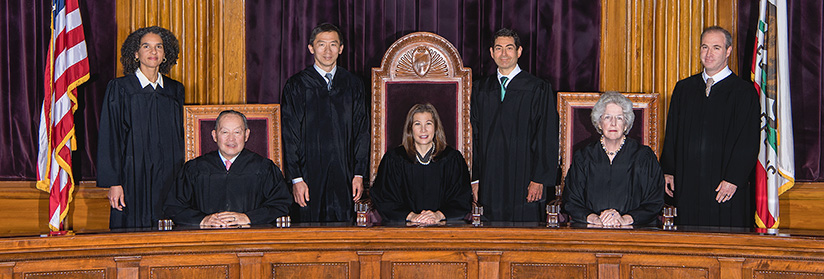
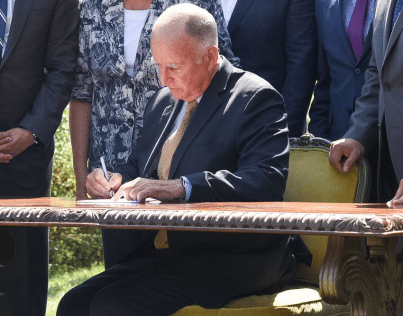
Re the dissenting Supreme Court justices, Katy Grimes notes:
“How can any judge on the Supreme Court not believe in merit?”
No kidding —- that really gets to the heart of the matter, doesn’t it?
This decision seems to come in the nick of time, when the SAT, LSAT, and MCAT, for undergraduate, then law school and medical school admission considerations have been dropped by even Ivy League schools, and all considerations of merit have been increasingly tossed in favor of the destructive left’s bat-bleep-crazy laser focus on irrelevant characteristics of “special interest groups” ONLY. Seems to me the inevitable result of these merit-dumping practices is a populace that further abandons establishment medical care and thinks twice or more about crossing a bridge or getting on an elevator, for example. Imagine. Every piece of infrastructure, every service, product, and transaction, etc., that even now we still take for granted, would become untrustworthy and begin to collapse without decisions based on a foundation of merit.
Now I’m wondering how this decision will affect all the destructive DEI nonsense in other settings besides college admissions that seems to be baked into EVERYTHING now, or if it will affect it.
Guess we’ll see.
The Gateway Pundit reported that Michelle Obama (aka Big Mike) issued an angry statement about the ruling and claimed that her own experiences as proof positive of the benefits of affirmative action. However, Michelle Obama conveniently forgot to mention why she was accepted into Princeton when her test scores were so low. A campaign spokeswoman earlier said that Michelle had an edge getting into Princeton not because of affirmative action, but because her older brother Craig was there as a scholar athlete.
The Daily Caller reported that Harvard University will use essays to continue to weigh students’ race in determining admission because the Supreme Court also ruled that colleges and universities may consider in admissions decisions ‘an applicant’s discussion of how race affected his or her life, be it through discrimination, inspiration, or otherwise.’
Oh, well, THAT’S a good reason! (*eyeroll*) Older Brother gets a SPORTS scholarship and low-test-scoring Sister Michelle is waved through admissions, no questions asked. I wonder what deserving student missed out on an Ivy League education because of Michelle? The nuts and bolts of the education may be lacking, but the prestige of the name (Princeton) is all a community-organizing high-paid bureaucrat like Michelle ever needs. Thanks for the delicious tidbit of info, TJ.
That would be the same Michelle Obama whose thesis looks and reads like it was written by a third grader. And who, early in Barack’s political career, was handed a $320,000 a year gig as Director of Community Outreach for the University of Chicago Medical Center.
No wonder she’s outraged about this decision. She and her husband’s careers have both been direct beneficiaries of affirmative action programs since Barry decided to step out of the Choom Room.
From a different article:
“In his majority opinion, Chief Justice John Roberts noted the clear evidence that these universities had discriminated against Asian Americans. At Harvard, a Black student in the fourth lowest academic decile has a higher chance of admission (12.8%) than an Asian student in the top decile (12.7%).”
Unfortunately, the “Gimme my free stuff” won’t go away any time soon.